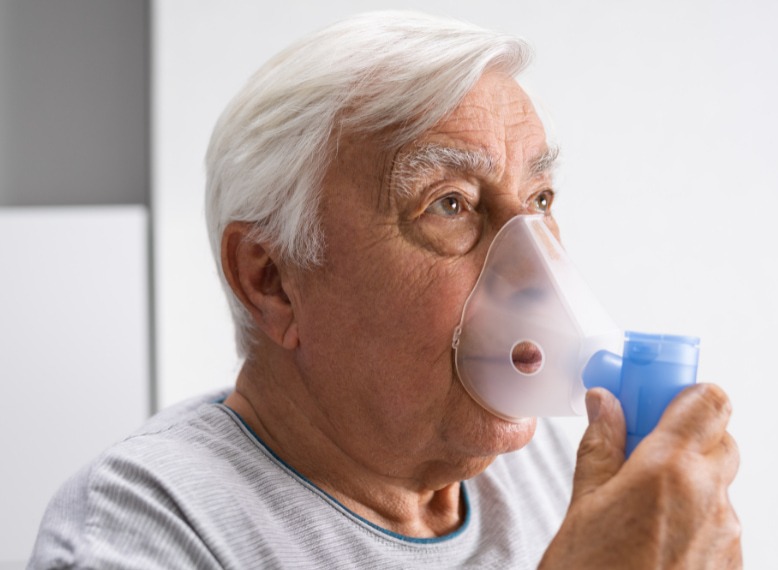COPD: Myths and facts about its causes, symptoms and treatments
Published Sep 27, 2021 • By Claudia Lima
Chronic obstructive pulmonary disease (COPD) is a chronic illness that affects the bronchial tubes in a progressive way and leads to accelerated destruction of the lungs.
What are some common misconceptions about this chronic respiratory illness? What is true and false about COPD?
We separate the true from the false in our article!

What is COPD?
Chronic obstructive pulmonary disease (COPD) is a chronic inflammatory disease of the bronchi. This means that it causes a permanent and progressive obstruction of the airways and a destruction of the alveoli of the lungs, which is called emphysema.
The disease causes breathing difficulties, with shortness of breath, impaired quality of life and a high risk of death.
The main cause of COPD is smoking. It is therefore more prevalent in current and former smokers.
There are other causes of COPD which also affect non-smokers:
- Secondhand smoking
- Pollution - both indoors (wood, coal, etc.) and outdoors (fine particles, etc.)
- Occupational exposure in an industrial or agricultural environment
- Genetic inheritance, in case of alpha-1-antitrypsin deficiency, a defect that affects the lungs,
- Consequences of certain illnesses such as drug addiction, HIV, anorexia nervosa and others.
The symptoms, often underestimated by patients, are chronic cough, sputum and shortness of breath. COPD deteriorates gradually and is punctuated by flare-ups (episodes of worsening symptoms).
To treat COPD, smoking must be stopped. Then, depending on the severity of the disease, bronchodilators, corticosteroids and antibiotics are prescribed, mainly for the treatment of symptoms. Then there is respiratory rehabilitation to facilitate breathing and recover breath and, in the most serious cases, oxygen therapy.
>> To learn more about COPD, read our medical fact sheet here <<
COPD in figures
In the US, it affects more thank 16.4 million people, but many more may be undiagnosed.
In Europe, it affects 23 million people. Approximately 15% of COPD cases occur in non-smokers, a proportion that reaches 50% in developing countries.
According to WHO estimates, by 2020 COPD will have become the 5th most common disease in the world and the 3rd leading cause of death.
In 80% of cases, smoking is the main cause.
There are many misconceptions about COPD, what are they? What is true and what is false?
Here are some of the most common misconceptions out there about COPD. Have you heard them before?
Let's unravel the true and the false:
COPD can be diagnosed with a just a simple test
True, pulmonary function testing (PFT) with a spirometer is conducted to measure breathing capacity. The result of this examination allows the disease to be classified according to the degree of severity of the respiratory discomfort.
The symptoms of COPD allow it to be diagnosed quickly
False, COPD symptoms often develop slowly, are wrongly linked to ageing and are often neglected.
There is no cure for COPD
False, symptoms can be treated and daily life improved depending on how advanced the disease is and how well the person responds to treatment.
Diet has no impact on COPD
False, if you are overweight, your lungs and heart are put under greater strain and if you are underweight, your symptoms will lead to more complications. It is important to maintain a balanced diet.
Quitting smoking is the best way to fight COPD
True, smoking contributes to bronchial inflammation and worsening of the symptoms of the disease
People with COPD shouldn't get vaccinated
False, vaccination against the flu is recommended yearly, in addition to the two pneumococcal vaccines that help protect against pneumonia.
Vaccination against COVID-19 is also highly recommended.
COPD is a rare disease
False, it is estimated that more than 64 million people live with COPD worldwide.
If you have any doubts that you may have COPD, you should get yourself screened, as an early diagnosis, especially in women, allows for effective treatment. It is estimated that 2/3 of people do not know they have COPD.
Scientific research is ongoing and treatments are ever evolving: The 2018 FDA approval of the Zephyr endobronchial valve (EBV) has led to the improvement in symptoms and quality of life of many patients with severe COPD.
Was this article helpful to you?
Give it a like and share your thoughts and questions with the community in the comments below!
Take care!
1 comment
You will also like

COPD: understanding the effects of cold weather on the disease and avoiding exacerbations
Nov 20, 2023 • 1 comment

 Facebook
Facebook Twitter
Twitter


